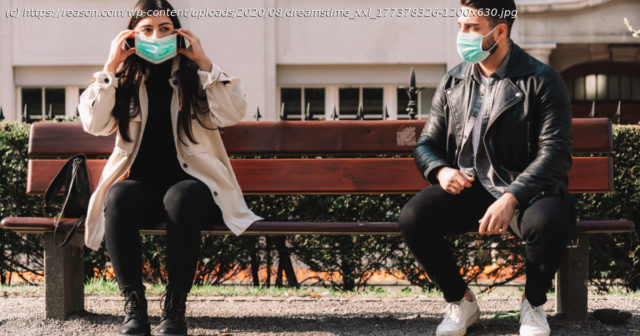Why libertarians (and everybody else) should socially distance, wear masks and get vaccinated.
The COVID-19 pandemic resembles a tragedy of the commons—a situation where people have little incentive to invest in conserving or producing a resource because they cannot prevent other people from using or taking it. The results are overconsumption, underinvestment, and ultimately the depletion of the resource. Classic examples of the tragedy of the commons include overfishing, air pollution, water pollution, and overgrazing. In the case of COVID-19, the resource is the public spaces that we all share with one another. Many of these are privately owned, such as grocery stores, salons, bars, restaurants, theaters, and concert venues. Others are not, including public schools, public subways, public parks, and city sidewalks. Disease microbes treat human bodies as a resource they use for reproduction. To prevent the microbial overexploitation of the health commons requires germ management. The best way to prevent invasive viruses, bacteria, and fungi from wreaking havoc is to enclose the commons of human bodies by erecting barriers to forestall the transmission of germs from person to person. Good fences make good healthy neighbors. Social distancing measures, facial coverings, and—hopefully soon—safe and effective vaccines are the best ways to enclose the health commons against the COVID-19 scourge. Let’s take a look at each of these barriers to coronavirus transmission. Social distancing measures include limiting large gatherings of people, closing buildings, and canceling events. They include encouraging people to telecommute for work; closing bars, restaurants, theaters, gyms and schools; canceling sporting events and concerts; and advising people to try to maintain a personal space of six feet when interacting with others in public. Let’s consider the case of closing restaurants and bars. Many individual restaurateurs and bar owners would surely voluntarily assume the costs of such pandemic precautions as limiting indoor service, spacing tables further apart, setting up physical barriers, and restricting the number of customers served at a time. Taking such costly precautions also benefits the entire economy, and people who are not customers, by reducing the risks of an outbreak and enabling recovery to begin. But if all other businesses are paying for such costly measures, a competing restaurant has an incentive to free-ride off a healthier pool of customers by easing its own social distancing rules. The tragedy of the health commons occurs as social distancing erodes among competing dining and drinking establishments, revving up the epidemic again. There is, therefore, a strong case for compensating the businesses that shut down to implement social distancing policies and their employees who had to stay home.






